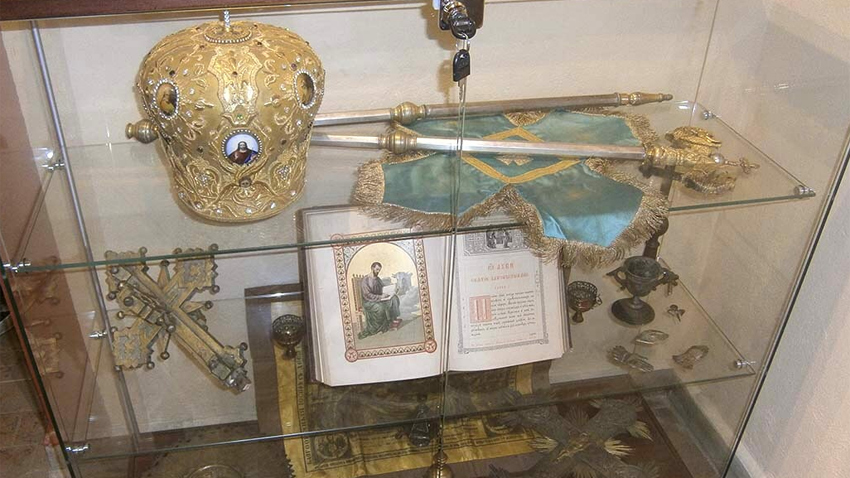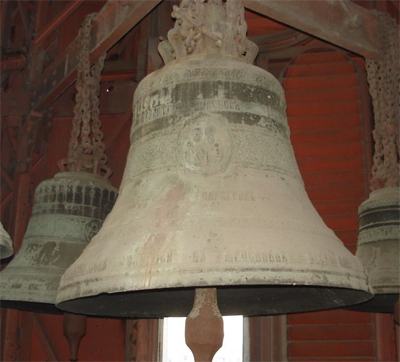The Bulgarian St Stephen Church in Istanbul (also known as the Bulgarian Iron Church), associated with the fight for church independence that started back in the 1930’s and the 1940’s, is the world’s only iron Orthodox Church. It is 20 meters tall, including the bell tower. The Bulgarian Orthodox temple was built over 500 square meters. It is a three-nave cross-shaped basilica. It was made of pre-fabricated cast iron elements. The altar faces the Golden Horn and a 40 meter high beautiful belfry.
The Bulgarian Iron Church was built at the end of the 19th century when the Bulgarian community in Istanbul (then Tsarigrad) amounted to 50,000 people. In 1849 statesman Stefan Bogoridi donated a plot of land with several buildings-a wooden and two stone houses situated in Fener district in Istanbul. The wooden house was later reorganized as wooden church.

On October 17, 1849, an Ottoman royal decree allowing the Bulgarians to have their own religious temple was issued. Then, the ground floor of the wooden house donated by Stefan Bogoridi was turned into a temporary chapel. Later, it became a separate church named after First Martyr and Archdeacon St Stephen in honor of benefactor Stefan Bogoridi. The temple was known at that time as the Wooden Church.
In 1850 the stone buildings in the church yard were demolished and later a three-story building, known as the Convent, was built instead. It became headquarters of the Bulgarian Exarchate, established on February 27, 1870. The Bulgarian Exarchate functioned in Istanbul even after Bulgaria’s liberation- until the Balkan War in 1912.
 On June 25, 1890 an Ottoman royal decree allowed the Bulgarian Exarchate to build a new church on these premises. The new church was inaugurated by Exarch Joseph. An iron frame was preferred to concrete reinforcement due to weak ground conditions. The construction plans of the Iron Church were prepared by the Ottoman Armenian Architect Hovsep Aznavur. The pre-fabricated iron elements weighing 500 tons were made in Vienna and transported to Istanbul (Tsaribrod) by ship through the Danube and the Black Sea. The main skeleton of the Iron Church was made of steel and covered by metal boards. It was completed on July 14, 1896. In terms of architecture, the Iron Church combines Neo-Gothic and Neo-Baroque influences. The icons were painted by a Russian artist and the six church bells were also cast in Russia. Two of them are still in use.
On June 25, 1890 an Ottoman royal decree allowed the Bulgarian Exarchate to build a new church on these premises. The new church was inaugurated by Exarch Joseph. An iron frame was preferred to concrete reinforcement due to weak ground conditions. The construction plans of the Iron Church were prepared by the Ottoman Armenian Architect Hovsep Aznavur. The pre-fabricated iron elements weighing 500 tons were made in Vienna and transported to Istanbul (Tsaribrod) by ship through the Danube and the Black Sea. The main skeleton of the Iron Church was made of steel and covered by metal boards. It was completed on July 14, 1896. In terms of architecture, the Iron Church combines Neo-Gothic and Neo-Baroque influences. The icons were painted by a Russian artist and the six church bells were also cast in Russia. Two of them are still in use.
The official inauguration of the new St Stephen Church was made by Exarch Joseph on the Nativity of Mary feast on September 8, 1898. Today, the St Staphen church is one of the world’s few metal churches.
Bulgarian church figures such as Ilarion of Makariopol, Avksentiy Veleshki, Maletiy Veleshki and Paisii of Plovdiv were buried in the church yard.
The St Stephen Church which marks its 120 anniversary in 2018 is regarded the most-valuable monument of the Bulgarian historical and cultural heritage in Turkey and abroad. The official inauguration and resanctification of the fully-renovated church will be held today and the church service will be carried out by Ecumenical Patriarch Bartholomew and the Bulgarian Patriarch Neophyte.
Today, Bulgaria celebrates the 140th anniversary of the Unification of the Principality of Bulgaria and Eastern Rumelia. The center of the festivities is Plovdiv, where on this day in 1885, after the entry of the Golyamo Konare detachment into the..
In June 1878, after the 10 th Russo-Turkish war in a row, at the Berlin congress, the lands in the Balkans inhabited by Bulgarians were divided up into five. Northern Dobrudja was handed over to Romania. Serbia got the Sanjak of Niš. The lands..
It was 1883 when construction began in Plovdiv on the building of the Regional Assembly of Eastern Rumelia, based on a design by architect Pietro Montani. Eastern Rumelia was an autonomous Bulgarian province within the Ottoman Empire and one of the..
It was 1883 when construction began in Plovdiv on the building of the Regional Assembly of Eastern Rumelia, based on a design by architect Pietro..
Today, Bulgaria celebrates the 140th anniversary of the Unification of the Principality of Bulgaria and Eastern Rumelia. The center of the festivities..
In June 1878, after the 10 th Russo-Turkish war in a row, at the Berlin congress, the lands in the Balkans inhabited by Bulgarians were divided up..

+359 2 9336 661
